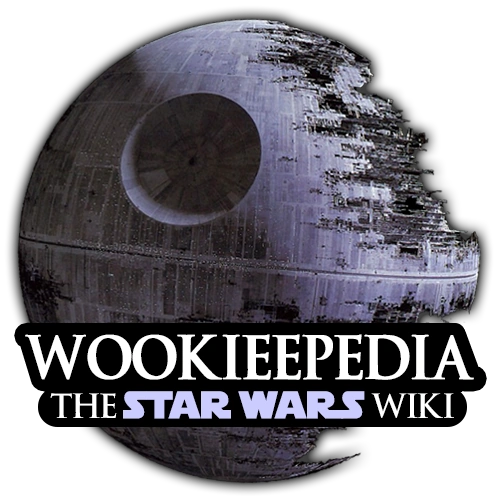The goal of Wookieepedia is to be a reliable, concise guide to all readers. To this end, it is necessary for us to restrict to some extent the type of information we accept. Wookieepedia follows the canonical hierarchy established by Lucas Licensing in 2000. While some non-canon material may be covered on Wookieepedia, it should be clearly marked as such.
Canon resources
The following outlines resources that are canon, those that are non-canon and those of unclear canon status. A discussion of how canon resources "rank" follows.
What is considered a valid resource?
- All Star Wars films
- All Databank entries, Encyclopedia entries, and source material on StarWars.com, as well as any other articles on the official site that provide unique canonical information
- All episodes of Star Wars: Droids, Star Wars: Ewoks, Star Wars: Clone Wars, and Star Wars: The Clone Wars television series
- All live-action Star Wars specials/TV series
- All Marvel Comics and most Dark Horse Comics (see below) products
- All West End Games and Wizards of the Coast roleplaying books
- All novels, reference books, and collections of short stories published by Bantam Spectra, Del Rey, Dorling Kindersley or any other officially licensed publishers
- All young reader storybooks
- All Topps, Decipher and Wizards of the Coast cards and web sites
- All other official Star Wars websites, such as swtor.com and HoloNet News
- All LucasArts video and computer games, and related manuals, official strategy guides and web sites
- All issues of Star Wars Gamer, Star Wars Insider, The Lucasfilm Fan Club Magazine, Bantha Tracks, Star Wars Official Poster Monthly, and The Official Star Wars Fact File
- All comments from Leland Chee or other VIPs regarding the content of the Holocron continuity database or official Lucasfilm decrees.
- Officially licensed toys and any descriptions on their packaging
What is not considered a valid resource?
- Fan-made blueprints and specifications
- Fan fiction of any kind
- Conjecture based on our own universe (with the exception, of course, of any such conjecture officially published by Lucas Licensing)
- Websites, unless information is clearly stated as sourced from a valid reference.
- Game elements that appear only when triggering a non-canonical branch of the game; that means persons who appear when the Jedi Exile is male, or events happening when Kyle Katarn chooses the dark side ending of the game.
What is unclear?
- Dark Horse Comics Tales #1–20
- Unlicensed game magazines
- Comments by Lucasfilm VIPs other than those listed above. Statements of authorial-intent, information released by authors to clarify details of their works, may or may not be canon
- Outcomes of alternative solutions to side-quests in games, such as the fate of the droid C8-42 in KOTOR
- Roleplaying supplements, where there are alternative outcomes
- Information from cut sources is generally non-canon, but in some cases may be confirmed as canon
Conflicting canon
When two canon sources conflict, one must consider the two sources and compare their origin.
- The films and the word of George Lucas are final. They are incontrovertible. When comparing different versions of the films, the most recent are considered the highest canon, and their edits considered Lucas's original intent and final vision. Production notes are considered to be part of the films.
- Content published on StarWars.com, including the Databank and blogs by Leland Chee and Sue Rostoni, brings any information to a near-film status of acceptability.
- Expanded Universe information and characters not included in the films, including reference books. This also includes the stories presented in games, but not the actual on-screen gameplay or stats.
In some cases, a source may be contradicted into complete non-canon. In others, only part will be contradicted by a higher source, while the rest remains canon. As long as a piece of information comes from a canon source and is not contradicted by a higher source, it is accepted as canon. For example, an EU novel may introduce a starship, but not detail its weaponry. Later, a WOTC RPG supplement may provide game statistics for the starship previously introduced, including its weaponry. So long as the weaponry detailed in the WOTC source are not contradicted by an existing source, they are considered canon. You must be vigilant, however, as Star Wars authors are prone to reintroducing obscure references from the EU, and the WOTC statistics may eventually be overridden.
Official non-canon sources
There are a number official Star Wars sources that are considered to be non-canonical, in particular, those published under the Infinities label. Information from such sources can feature in Wookieepedia articles, but it must be made clear that the information is not canon.
Deleting invalid articles
If you believe an article contains nothing but invalid canon information, it should be listed in Wookieepedia:Trash compactor. A discussion forum will then be held by the community regarding the article's validity and whether the article should be deleted or not. In general, the forum will last two weeks before consensus is determined by an administrator.
If an article is concerning a canon subject but contains information from a non-valid resource, the issue should be debated on the article's individual talk page, and the article should be edited as appropriate.
Except in cases of vandalism, obscenity, and other nonsense, you should not edit the article and simply delete the text.
See also
- Forum:CT Archive/Canon policy
- Wookieepedia:Dispute resolution
